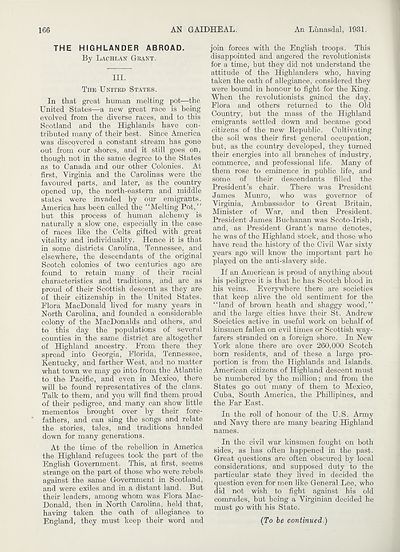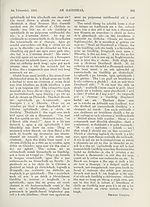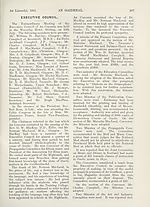An Comunn Gàidhealach Publications > Gaidheal > Volume 26, October 1930--September 1931
(214) Page 166
Download files
Complete book:
Individual page:
Thumbnail gallery: Grid view | List view

AN GAIDHEAL.
An Lunasdal, 1931.
THE HIGHLANDER ABROAD.
By Lachlan Grant.
III.
The United States.
In that great human melting pot—the
United States—a new great race is being
evolved from the diverse races, and to this
Scotland and the Highlands have con¬
tributed many of their best. Since America
was discovered a constant stream has gone
out from our shores, and it still goes on,
though not in the same degree to the States
as to Canada and our other Colonies. At
first, Virginia and the Carolinas were the
favoured parts, and later, as the country
opened up, the north-eastern and middle
states were invaded by our emigrants.
America has been called the “Melting Pot,’’
but this process of human alchemy is
naturally a slow one, especially in the case
of races like the Celts gifted with great
vitality and individuality. Hence it is that
in some districts Carolina, Tennessee, and
elsewhere, the descendants of the original
Scotch colonies of two centuries ago are
found to retain many of their racial
characteristics and traditions, and are as
proud of their Scottish descent as they are
of their citizenship in the United States.
Flora MacDonald lived for many years in
North Carolina, and founded a considerable
colony of the MacDonalds and others, and
to this day the populations of several
counties in the same district are altogether
of Highland ancestry. From there they
spread into Georgia, Florida, Tennessee,
Kentucky, and farther West, and no matter
what town we may go into from the Atlantic
to the Pacific, and even in Mexico, there
will be found representatives of the clans.
Talk to them, and yqu will find them, proud
of their pedigree, and many can show little
mementos brought over by their fore¬
fathers, and can sing the songs and relate
the stories, tales, and traditions handed
down for many generations.
At the time of the rebellion in America
the Highland refugees took the part of the
English Government. This, at first, seems
strange on the part of those who were rebels
against the same Government in Scotland,
and were exiles and in a distant land. But
their leaders, among whom was Flora Mac¬
Donald, then in North Carolina, held that,
having taken the oath of allegiance to
England, they must keep their word and
join forces with the English troops. This
disappointed and angered the revolutionists
for a time, but they did not understand the
attitude of the Highlanders who, having
taken the oath of allegiance, considered they
were bound in honour to fight for the King.
When the revolutionists gained the day,
Flora and others returned to the Old
Country, but the mass of the Highland
emigrants settled down and became good
citizens of the new Republic. Cultivating
the soil was their first general occupation,
but, as the country developed, they turned
their energies into all branches of industry,
commerce, and professional life. Many of
them rose to eminence in public life, and
some of their descendants filled the
President’s chair. There was President
James Munro, who was governor of
Virginia, Ambassador to Great Britain,
Minister of War, and then President.
President James Buchanan was Scoto-Irish,
and, as President Grant’s name denotes,
he was of the Highland stock, and those who
have read the history of the Civil War sixty
years ago will know the important part he
played on the anti-slavery side.
If an American is proud of anything about
his pedigree it is that he has Scotch blood in
his veins. Everywhere there are societies
that keep alive the old sentiment for the
“land of brown heath and shaggy wood,’’
and the large cities have their St. Andrew
Societies active in useful work on behalf of
kinsmen fallen on evil times or Scottish way¬
farers stranded on a foreign shore. In New
York alone there are over 260,000 Scotch
born residents, and of these a large pro¬
portion is from the Highlands and Islands.
American citizens of Highland descent must
be numbered by the million; and from the
States go out many of them to Mexico,
Cuba, South America, the Phillipines, and
the Far East.
In the roll of honour of the U.S. Army
and Navy there are many bearing Highland
names.
In the civil war kinsmen fought on both
sides, as has often happened in the past.
Great questions are often obscured by local
considerations, and supposed duty to the
particular state they lived in decided the
question even for men like General Lee, who
did not wish to fight against his old
comrades, but being a Virginian decided he
must go with his State.
(To be continued.)
An Lunasdal, 1931.
THE HIGHLANDER ABROAD.
By Lachlan Grant.
III.
The United States.
In that great human melting pot—the
United States—a new great race is being
evolved from the diverse races, and to this
Scotland and the Highlands have con¬
tributed many of their best. Since America
was discovered a constant stream has gone
out from our shores, and it still goes on,
though not in the same degree to the States
as to Canada and our other Colonies. At
first, Virginia and the Carolinas were the
favoured parts, and later, as the country
opened up, the north-eastern and middle
states were invaded by our emigrants.
America has been called the “Melting Pot,’’
but this process of human alchemy is
naturally a slow one, especially in the case
of races like the Celts gifted with great
vitality and individuality. Hence it is that
in some districts Carolina, Tennessee, and
elsewhere, the descendants of the original
Scotch colonies of two centuries ago are
found to retain many of their racial
characteristics and traditions, and are as
proud of their Scottish descent as they are
of their citizenship in the United States.
Flora MacDonald lived for many years in
North Carolina, and founded a considerable
colony of the MacDonalds and others, and
to this day the populations of several
counties in the same district are altogether
of Highland ancestry. From there they
spread into Georgia, Florida, Tennessee,
Kentucky, and farther West, and no matter
what town we may go into from the Atlantic
to the Pacific, and even in Mexico, there
will be found representatives of the clans.
Talk to them, and yqu will find them, proud
of their pedigree, and many can show little
mementos brought over by their fore¬
fathers, and can sing the songs and relate
the stories, tales, and traditions handed
down for many generations.
At the time of the rebellion in America
the Highland refugees took the part of the
English Government. This, at first, seems
strange on the part of those who were rebels
against the same Government in Scotland,
and were exiles and in a distant land. But
their leaders, among whom was Flora Mac¬
Donald, then in North Carolina, held that,
having taken the oath of allegiance to
England, they must keep their word and
join forces with the English troops. This
disappointed and angered the revolutionists
for a time, but they did not understand the
attitude of the Highlanders who, having
taken the oath of allegiance, considered they
were bound in honour to fight for the King.
When the revolutionists gained the day,
Flora and others returned to the Old
Country, but the mass of the Highland
emigrants settled down and became good
citizens of the new Republic. Cultivating
the soil was their first general occupation,
but, as the country developed, they turned
their energies into all branches of industry,
commerce, and professional life. Many of
them rose to eminence in public life, and
some of their descendants filled the
President’s chair. There was President
James Munro, who was governor of
Virginia, Ambassador to Great Britain,
Minister of War, and then President.
President James Buchanan was Scoto-Irish,
and, as President Grant’s name denotes,
he was of the Highland stock, and those who
have read the history of the Civil War sixty
years ago will know the important part he
played on the anti-slavery side.
If an American is proud of anything about
his pedigree it is that he has Scotch blood in
his veins. Everywhere there are societies
that keep alive the old sentiment for the
“land of brown heath and shaggy wood,’’
and the large cities have their St. Andrew
Societies active in useful work on behalf of
kinsmen fallen on evil times or Scottish way¬
farers stranded on a foreign shore. In New
York alone there are over 260,000 Scotch
born residents, and of these a large pro¬
portion is from the Highlands and Islands.
American citizens of Highland descent must
be numbered by the million; and from the
States go out many of them to Mexico,
Cuba, South America, the Phillipines, and
the Far East.
In the roll of honour of the U.S. Army
and Navy there are many bearing Highland
names.
In the civil war kinsmen fought on both
sides, as has often happened in the past.
Great questions are often obscured by local
considerations, and supposed duty to the
particular state they lived in decided the
question even for men like General Lee, who
did not wish to fight against his old
comrades, but being a Virginian decided he
must go with his State.
(To be continued.)
Set display mode to:
![]() Universal Viewer |
Universal Viewer | ![]() Mirador |
Large image | Transcription
Mirador |
Large image | Transcription
| An Comunn Gàidhealach > An Comunn Gàidhealach Publications > Gaidheal > Volume 26, October 1930--September 1931 > (214) Page 166 |
|---|
| Permanent URL | https://digital.nls.uk/125154972 |
|---|
| Description | This contains items published by An Comunn, which are not specifically Mòd-related. It includes journals, annual reports and corporate documents, policy statements, educational resources and published plays and literature. It is arranged alphabetically by title. |
|---|
| Description | A collection of over 400 items published by An Comunn Gàidhealach, the organisation which promotes Gaelic language and culture and organises the Royal National Mòd. Dating from 1891 up to the present day, the collection includes journals and newspapers, annual reports, educational materials, national Mòd programmes, published Mòd literature and music. |
|---|---|
| Additional NLS resources: |
|

